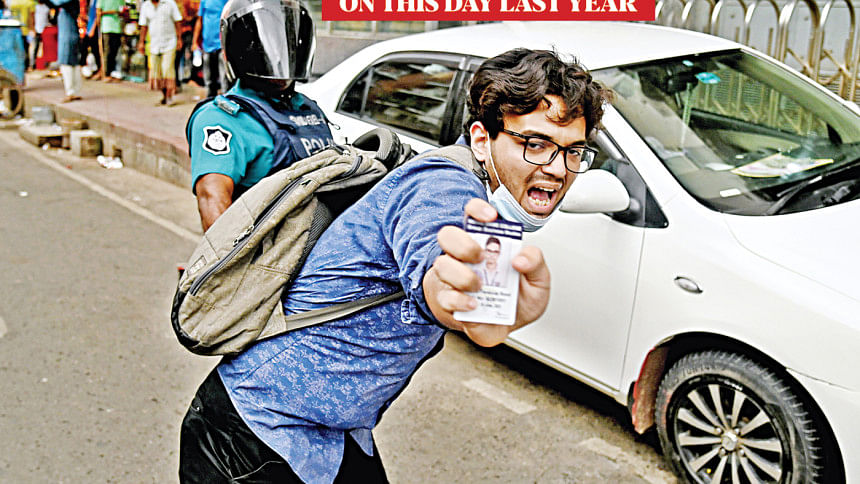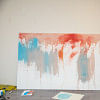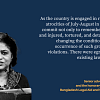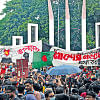July 29, 2024: Protesters return, undeterred

On July 29, 2024, the Awami League-led 14-party alliance recommended that the government ban Jamaat-e-Islami and its student wing, Islami Chhatra Shibir, citing their alleged involvement in anti-state activities. The recommendation came during a meeting held at the Gono Bhaban, presided over by AL President Sheikh Hasina. Hasina, then prime minister, reportedly stated that her government would act on the alliance's recommendation and issue a gazette notification within two days.
On the same day, the High Court expressed strong displeasure at the Detective Branch (DB) of police for taking six coordinators of the quota reform protests to its office and staging a media interaction showing them being served food. During a hearing on a petition, the bench of Justice Mustafa Zaman Islam and Justice SM Masud Hossain Dolon sharply criticised the move, asking, "Don't mock the nation. Who told you to do this?" The judges remarked that "whoever is taken there is made to sit at the dining table," questioning the intentions behind such optics.
The petition, filed by Supreme Court lawyers Aynunnahar Siddiqua and Manzur-Al-Matin, demanded the immediate release of the six detained coordinators and an end to the use of bullets against peaceful protesters.
Amnesty International also weighed in, urging the Bangladeshi authorities to end mass arrests and arbitrary detention of student leaders and protesters. In a statement, Smriti Singh, Amnesty's South Asia Regional Director, condemned the arrest and detention of thousands, noting that over 9,000 individuals had been detained over the weekend alone in connection with the ongoing quota-reform protests.
Despite heavy police presence and widespread crackdowns, quota reform protesters took to the streets across the country, including major demonstrations in Dhaka and Chattogram. Law enforcers, however, dispersed many of the gatherings and detained at least 80 people nationwide. In several areas, ruling party activists reportedly obstructed protests as well.
Students from various colleges and universities mobilised to protest the detention of the six coordinators and the alleged coercion they faced to declare an end to the movement.
In Chattogram, police detained at least ten students after breaking up a protest in the Jamal Khan area. Later, another group of students near Andarkilla Shahi Jame Masjid hurled brick chunks at police, prompting a response with rubber bullets and more teargas.
In Dhaka, law enforcers detained at least 70 people from various locations. The previous night, coordinator Abdul Kader had announced via social media that demonstrations would be staged at eight points in the capital, including Science Lab, North South University Gate-8, Jatiya Press Club, BNS Centre in Uttara, Mirpur-10, ECB Chattar, Rampura, and Mohakhali.
Witnesses reported that hundreds of protesters gathered near ECB Chattar around noon, but police chased them off when they began chanting slogans. At least 18 demonstrators were detained from that location. Police also detained 10 protesters from Mirpur-10, 10 from Dhanmondi (in front of Star Kabab), six from Badda, two from Purana Paltan, and another 10 from Uttara.
Protests continued outside Dhaka as well. At Jahangirnagar University, students demanded the unconditional release of all detained protest leaders. Several JU teachers joined the demonstration to express solidarity.
At the University of Dhaka, teachers under the banner of the Anti-Repression Teachers' Rally gathered at Aparajeyo Bangla, calling for an immediate end to the harassment and mass arrests of students.
In Rajshahi, hundreds of Rajshahi University students blocked the Dhaka–Rajshahi highway from 12:20pm to 1:00pm, demanding justice for the deaths of fellow students and accountability for those responsible.
At Barishal University, at least 15 students were injured when Chhatra League activists allegedly attacked protesters near the administrative building around 2:00pm. One injured student, Sujoy Subho, said that 40–50 Chhatra League men armed with sticks had launched the attack during a planning meeting.
In Barishal city, students from Government Brojomohun (BM) College protested at Nathullabad Central Bus Terminal, while in Noakhali, students blocked the Dhaka–Noakhali highway in front of Noakhali Zilla School for three hours from 2:00pm. In Thakurgaon, over 200 students staged a black-flag procession demanding justice for those killed.
Police in Mymensingh dispersed a student demonstration in Firoz-Jahangir Chattar in the afternoon. In Cumilla, around 60 students from Comilla University were obstructed by pro-Awami League activists wielding sticks and iron rods as they tried to march towards the Dhaka–Chattogram highway. The students later held a rally in front of their campus around 3:00pm.
In Sylhet, students from Shahjalal University of Science and Technology protested at the main gate around 3:00pm before taking out a procession. In Dhaka, cultural platform Bangladesh Udichi Shilpigosthi was prevented from holding a scheduled protest rally at the Jatiya Press Club, which remained cordoned off by security personnel.
Later in the evening, some quota reform coordinators rejected the government's call to observe a national mourning day for those killed in the recent violence. Instead, they urged students and citizens to cover their faces with red cloths and post photos online the next day. The call was made in a press release signed by Mahin Sarker of the Anti-discriminatory Student Movement and sent to the media around 9:30pm.
"We would like to tell the government that no movement in the history of Bengal could be suppressed by firing at students. Immediately accept our nine-point demand and bring stability to the country," the statement said. Their demands included an apology from Prime Minister Sheikh Hasina and the resignations of six ministers, including the Home Minister, Education Minister, and others responsible for law enforcement and information.
Meanwhile, the six detained protest organisers—Nahid Islam, Asif Mahmud, Abu Baker Majumder, Hasnat Abdullah, Sarjis Alam, and Nusrat Tabassum—remained in DB custody. Their families were allowed to meet them around 2:00pm. The Detective Branch claimed the detention was necessary "to ensure their security."
In a significant development, 74 eminent citizens—including academics, human rights defenders, and lawyers—called for an independent, UN-led investigation into all deaths, injuries, and reports of torture related to the recent protests.
In a parallel move, a group of leading citizens formed a National Mass Inquiry Commission to investigate allegations of legal and human rights violations during the crackdown. The nine-member body, co-chaired by Justice Md Abdul Matin and human rights advocate Sultana Kamal, was composed of lawyers, teachers, cultural figures, and guardians. The commission issued a public call for evidence and information to help uncover the truth behind the recent violence, deaths, and mass arrests.

 For all latest news, follow The Daily Star's Google News channel.
For all latest news, follow The Daily Star's Google News channel. 








Comments